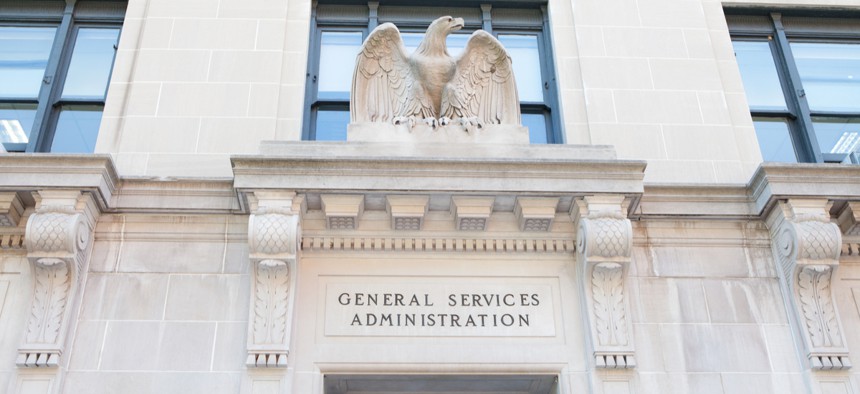GSA Watchdog Details Clash That Drove Sharpe from Acquisition Service

Mark Van Scyoc/Shutterstock.com
The unredacted report features new details about a fight over the technology modernization fund.
Days after the story broke that the General Services Administration’s resigned head of acquisition was now a whistleblower, the GSA inspector general released the full, unredacted report on Tom Sharpe’s clash with Denise Turner Roth over control of a technology modernization fund.
Sharpe’s complaint—which the IG substantiated and forwarded to the Office of Special Counsel—grew out of a 3-year-old disagreement over a statute’s flexibility. Described in the report as a “rule and law” type of person, Sharpe questioned the legality of Roth’s decision to move a technology modernization fund out of Sharpe’s Federal Acquisition Service portfolio and to fund the new Technology Transformation Service through the FAS-controlled multibillion-dollar Acquisition Services Fund.
The IG deemed Sharpe’s complaints “protected disclosures.” Those included expressing “concerns of violations of law, gross mismanagement, a gross waste of funds and abuse of authority to former Administrator Roth, the former deputy administrator, the former General Counsel, and the OIG.”
» Get the best federal technology news and ideas delivered right to your inbox. Sign up here.
Since taking over GSA in 2015, Roth was under pressure—like her predecessor Dan Tangherlini—from the Office of Management and Budget to keep GSA’s 18F digital services program innovative. Tangherlini had moved the management of 18F to the Office of Citizens Services and Innovative Technologies to take advantage of its “innovation culture,” and Sharpe initially agreed to administer the ASF to fund 18F projects.
“Early on, tension arose from Sharpe’s insistence on the application of standard business assessments to ensure that the ASF funds were being invested in prudent ventures,” the IG wrote.
Roth then determined Sharpe had largely been absent from related decisions, and she tapped GSA Deputy Administrator Adam Neufeld to take charge.
The inspector general’s auditors, however, said: “We did not find any evidence that Sharpe removed himself from the process. Instead…., Roth’s July 20, 2016, email advising that she had assigned investment oversight to Neufeld created uncertainty about how the new process would work, and particularly whether Sharpe even would have a meaningful role as the statutory commissioner accountable for the ASF. His efforts to seek guidance from Roth, Neufeld, and General Counsel [Kris] Durmer do not show withdrawal from Roth’s new governance process.”
Roth also consulted the GSA Office of General Counsel on the restructured the lines of authority and, in December 2015, made inquiries about moving Senior Executive Service members and improving their performance. The investigators saw this as her possibly backtracking on what had previously been a solid Level 4 performance review for Sharpe, who had also just received a bonus.
Roth’s inquiries to human resources are seen as related to Sharpe’s revelation that he had filed his complaint with the inspector general. It could explain why both Sharpe and his deputy Kevin Youel Page resigned suddenly this month, effective June 24, just as the Trump team was arriving to take their places—both had opposed Roth’s move of the funding stream out of their control.
In a statement to Federal News Radio last Friday, Roth said, “the OIG’s findings are wrong and disappointing.” The report portrays her as wanting to meet with Sharpe to work out a compromise.
But in conclusion, “the OIG also found by a preponderance of the evidence that administrator Roth had the authority to take or threaten to take personnel actions, and that she made statements and took actions that threatened Sharpe with transfer because of his protected activities. After receiving guidance from GSA’s General Counsel, Roth did not follow through on the threat of transfer. However, she significantly changed Sharpe’s responsibilities by adopting a new governance process for TTS’s use of the ASF, in reprisal for Sharpe’s protected activity.”
The Office of Special Counsel declined comment. Sharpe did not respond to inquiries.
Former Deputy Administrator Neufeld, who left GSA in February and joined Georgetown University’s Institute for Technology Law and Policy, said in a statement to Government Executive:
While 18F has certainly had some growing pains, the program is one of the few initiatives supported by both the Trump and the Obama administrations because of its transformative potential. Tom opposed the idea of 18F from its first suggestion by Administrator Tangherlini years ago. Whether he opposed 18F for substantive reasons or just to ‘protect his turf,’ he is entitled to his opinion.
However, Neufeld added:
He is not entitled to obstruct decisions that are lawful. He continually took steps to frustrate the initiative. As a result, his responsibilities over the program were gradually reassigned over the past four years, all consistent with the law. This happened both before and after notification to the Inspector General. Lawfully reassigning the responsibilities of an employee who is failing to perform his functions effectively and in good faith is what taxpayers deserve.






